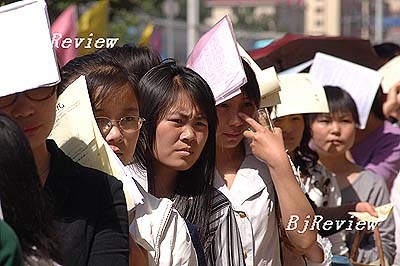|

Women's average pre-tax income was 65 percent of men's in Shanghai in 2005, down from 73 percent reported in 2000
As Chinese society is shifting into the market economy, women are becoming more vulnerable in the job market. The pressure women face outside their homes is sometimes transmitted into their family life
"Women can hold up half the sky!" With this statement, the late Chinese leader Mao Zedong put an end to an era when women were considered inferior to men. The constitution of China stipulates, "Women in the People's Republic of China enjoy equal rights with men in all spheres of life; in political, economic, cultural, social and family life." Empowered by equal education and employment opportunities, women have gained higher status in and out of their homes and have achieved great successes in arts, education, technology, business and politics.
Despite remarkable improvements in women's overall social status, a gender gap still exists. Now, women find it difficult to get a job, to retain their job, to advance in their career and to balance personal life with career. Gender discrimination in employment is prohibited by the Employment Promotion Law, which will come into force on January 1, 2008. The new law also forbids employers from including clauses in the employment contract to restrict women's freedom to get married or give birth to a child.
Tilted scale
Social transformation often shapes women's lives. Since China implemented its reform and opening-up policy in 1978, significant social and economic changes have taken place. China's economy has been growing rapidly and the country has lifted hundreds of millions of people in rural areas from absolute poverty.
"Despite such progress, China faces great challenges. Disparities between those who benefit from economic advancement and those who are left behind are sharpening," said the United Nations Development Program (UNDP). The World Bank estimates China's income disparity as measured by the Gini Coefficient has gone up by 50 percent in the past two decades.
In the meanwhile, the gender income gap has also widened. "Social and economic transition in China means that opportunities for women and men are changing rapidly. There are significant differences in the ways in which men and women benefit from growth," said Adrian Davis, the UK's Department of International Development (DFID) Representative in China, in a 2005 speech at the launch of China Gender Facilities, an initiative to reduce gender inequality through research and advocacy.
Profound changes have occurred in the labor market. The "iron rice bowl" has been broken. Mass layoffs during the restructuring of state-owned enterprises and the migration of rural surplus labor to the cities have intensified competition. To add worse to worst, job growth lags behind labor force growth. Until the early 1990s, the government assigned jobs to new graduates. State-owned enterprises and government organizations had to take the persons assigned to them. Now, women have to compete with men for jobs.
Moreover, firms are unabashed in profit seeking. In their recruitment advertisements, some firms do not even bother to disguise their preference for male candidates. Phrases such as "female preferred" and "male only" are frequently listed in job requirements. A survey administered by the Women's Federation of Shanghai revealed that a little over half of the female respondents replied that they had experienced gender discrimination during job searches. For women with a job, many find their careers negatively affected by maternity leave. Some women have even been fired after telling the company of their pregnancy.
In general, women's employment rate is lower than that of men. According to the 2005 Sample Census of China, women's employment rate was 6.7 percent lower than that of men for the 20-24 age group, 14.6 percent lower for the 25-29 group and 16 percent lower for the 30-34 group. Older women are in a more disadvantaged position than younger women.
Women's average income is also less than that of men. The 2000 China Population Census (2000 Census) showed that on average, women made 20 percent less than men. A statistic report on women in Shanghai exhibited that in 2005, women's average pre-tax income was 65 percent of that of men, down from the 73 percent reported in 2000.
| 